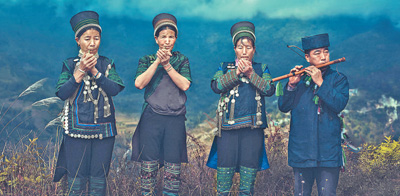Villager commits himself to popularizing ethnic folk songs sung in rice fields of SW China’s Yunnan
Singing traditional folk songs while working in the fields, people of the Hani ethnic group have turned terraced rice fields into a massive stage to showcase their strong bonds with nature, as well as the spirit of labor.
The tradition of singing while working in the rice fields has been passed down by the Hani people during the course of about 1,000 years in Honghe Hani and Yi Autonomous Prefecture, southwest China’s Yunnan Province.

Chen Xiniang (first from right) performs Hani polyphonic folk songs with his fellow villagers in terraced rice fields. (People’s Daily Online/Lei Yang)
Chen Xiniang, an inheritor of Hani polyphonic folk music, expressed his hope that the Hani songs can be kept alive among future generations and become world-famous one day. As a national-level intangible cultural heritage, Hani polyphonic folk music does not have any written lyrics and people must pass down the songs by teaching them to each other.
Chen started to learn Hani songs as a child after accompanying his parents to transplant rice seedlings in the fields. When he was 17 years old, Chen became a student under a folk artist who is a local inheritor of the Hani polyphonic folk music tradition. It took Chen eight years to develop all the various singing skills, and as of today he has mastered techniques at a high level, including singing and playing various musical instruments.
“The rice fields are a source of inspiration for us when creating songs,” said Chen, introducing that when there is a small group of people working in the fields together, they will sing their tunes louder; and when there are many people working together in the fields, they will sing relatively more softly and engage in polyphonic singing.
Chen and his fellow villagers first staged a show in Kunming, the provincial capital, in the 1980s, where their fabulous performances wowed members of the audience. Nowadays, with the concerted efforts of inheritors like Chen, Hani polyphonic folk songs have reached a wider audience from across the country and even around the world.
In 2005, Chen and nine other folk artists performed Hani polyphonic folk songs during a show held in the Netherlands. It was a valuable opportunity to be able to make their folk music heard by overseas audiences, expressed Chen.
“Nowadays, you cannot find many young people singing songs at home. They have opted to leave the village to search for jobs. If there is no one to carry forward Hani music, it will perish sooner or later,” Chen said, who added that he is always ready to teach the songs to more people as long as they are interested in the music.
Under the influence of their father, Chen’s son and daughter also joined in the effort to pass on the tradition of Hani polyphonic folk music, both now being engaged in the protection of the intangible cultural heritage. In addition, two of Chen’s students have become provincial-level inheritors and four have become prefecture-level inheritors of Hani polyphonic folk music.
Photos
Related Stories
Copyright © 2022 People's Daily Online. All Rights Reserved.










